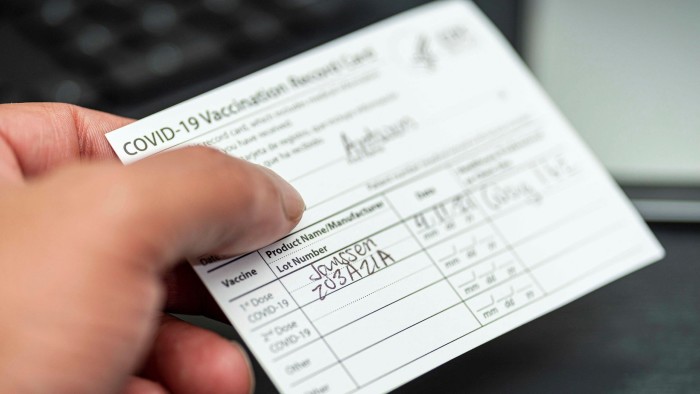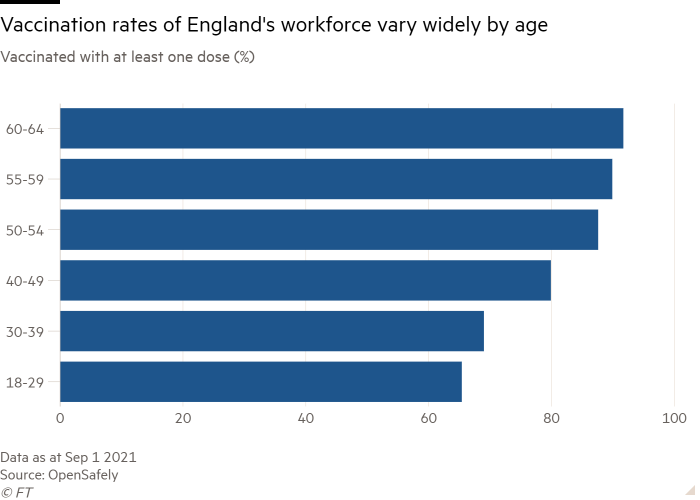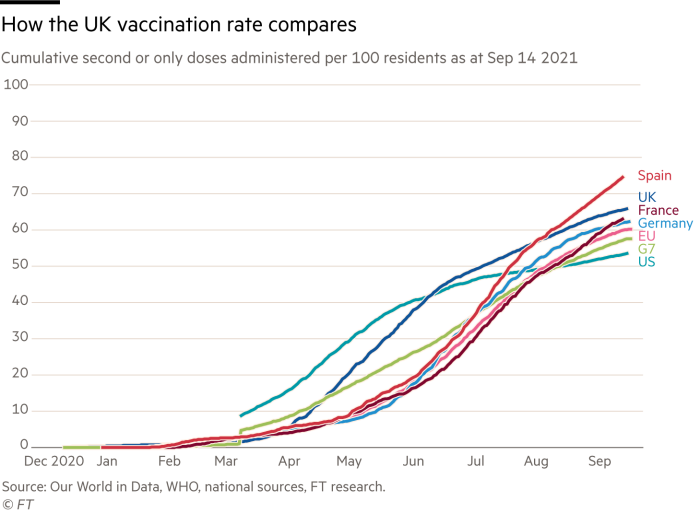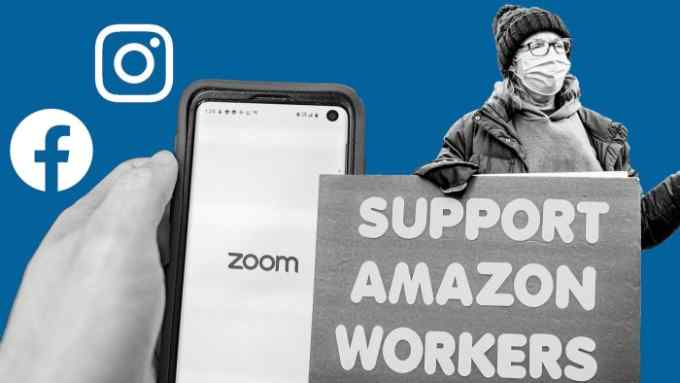UK employers grapple with vaccine policies

Roula Khalaf, Editor of the FT, selects her favourite stories in this weekly newsletter.
Employers in the UK have been warned by legal advisers that requiring staff to be vaccinated against Covid may prove problematic, as offices start to fill up again after the easing of pandemic restrictions.
About 89 per cent of Britons aged 16 and over have received at least one dose of Covid vaccine, but this hides wide variation by age. In England, where an age breakdown is available, more than a third of people in their 20s and over a quarter of people in their 30s are unvaccinated, compared with less than 10 per cent of people in their early 60s.
An official government survey also found 4 per cent of British adults felt hesitant about taking the vaccine, but this rose to 21 per cent among black people and 14 per cent among people identifying as Muslim.
Now, a survey of 500 UK senior executives by law firm Herbert Smith Freehills has found that 70 per cent of them are worried about the potential risks of discrimination against staff on the basis of vaccination status.

“Employers are in a really delicate balance between respecting everyone’s right to choose whether they get the vaccine or not, and keeping the entire workforce safe,” says Emma Röhsler, a partner at law firm Herbert Smith Freehills. “They need to respect the rights of those who don’t want to be vaccinated while also protecting those who have chosen to be vaccinated.”
Concerns are starting to mount regarding the legal and moral implications of asking staff to provide their vaccine status.
Marie Walsh, employment lawyer and founder of UK-based Consilia Legal, says that requiring proof of vaccination at work can be lawful, provided employers assess why the data is being collected and can justify how this information will be processed. “If you can’t demonstrate that asking workers to be vaccinated is a reasonable management instruction, you can’t insist they provide you with this information,” says Walsh.
She cites guidance from the Information Commissioner’s Office, the UK regulator, which says the legitimacy of recording workers’ vaccine status depends on “the sector you work in, the kind of work your staff do and the health and safety risks in your workplace”.

Vaccine requirements for workers have become a flashpoint in the US, where inoculation rates remain low, relative to some European countries. Earlier this month, US President Joe Biden announced a policy directing all federal employees and contractors to be vaccinated, with those refusing facing dismissal, as well as a plan to require workers at medium-sized or large companies with over 100 staff to be vaccinated or tested for the virus weekly.

In England, the government is considering whether vaccinations should be mandatory for frontline healthcare workers, having already decided to require it of social care staff from November. Other employers in the country will need to make their own decisions regarding vaccine policies.
“When it comes to vaccines, we don’t see the point in pushing people,” says Tomek Mlodzki, chief executive at Photo AiD, an online service for taking passport and ID photos. “Although some of them hold private beliefs, some suffer from health issues and can’t be vaccinated. No employee should have to choose between a vaccine and being fired.”
The UK’s health service says that “very few” people cannot be vaccinated for medical reasons — mainly those who are allergic to vaccine ingredients.
Sam Price, founder of Heatable, a boiler installations company, says “many employees remain incredibly anxious about coming back to the office” because of concerns about the Delta variant. He plans to encourage employees to get the jab where possible but does not believe that “it’s ever OK to request proof of vaccination”.
“It not only risks alienating those who have chosen not to be vaccinated but, since it’s an incredibly personal choice, we think it’s immoral to ask people to share such details openly,” says Price.
Lucy Lewis, partner at law firm Lewis Silkin, says: “Some employees will want management to be very proactive on health and safety, with mandatory vaccination or regular workplace testing policies, for example. However, others will be uneasy about such moves”.
Employers are being advised to listen carefully to the reasons why employees say they cannot be vaccinated, to avoid falling foul of anti-discrimination laws.
With some people still vulnerable to the virus despite being fully vaccinated, and some unable to have the vaccine for medical reasons, Lewis says that any employer will need to “consider how it can keep people in these groups safe and whether particular adjustments need to be made for them — for example, adjusted hours to avoid travel at busy times or working from home”.
“Other employees are deterred from getting the vaccine due to fear about taking time off to recover from potential side-effects,” adds Kerry Garcia, head employment lawyer at UK law firm Stevens and Bolton. She suggests that organisations could encourage staff to be vaccinated by offering incentives, such as paid time off to get the jab and adjustments to sick pay policy.
“It’s a really difficult period to navigate for employers,” warns Garcia. “We are telling our clients to avoid making vaccination a mandatory policy, but they should be encouraging their employees to get it instead.”

Comments